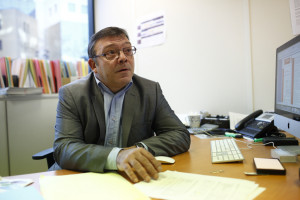William Molmy
answers our questions on the Département des Relations Internationales et des Partenariats (DRIP)

William Molmy, a research engineer at INED, directs the Department of International Relations and Partnerships (DRIP) since September 1, 2011
Why does this department at INED have a partnerships section?
In connection with the Institute’s 2011-2015 strategic orientations, INED’s director wanted to see a new structure created that would extend the missions of the Department of International Relations (DRI) to developing and bolstering INED’s partnerships with French, European and international actors active in the area of population sciences or research funding.
What are the Department’s missions?
The DRIP ensures the coordination of INED’s implication in such partnerships as the Pôles de Recherche et d’Enseignement Supérieur (PRES), Initiatives d’Excellence (IDEX) and Laboratoires d’Excellence (LABEX). It also facilitates synergies between the Institute and the international networks, in association with our research units and methodology groups, and supports research mobility (temporary stays abroad by researchers and research engineers, technicians and administrative personnel, the hosting of guest researchers at INED). Lastly, it participates in INED’s involvement in and transfer to the Campus Condorcet, which was just awarded the Grand Paris Label for its international visibility and contribution to city cohesion.
Is providing support for project proposals an important activity of the DRIP?
INED has decisive assets to offer potential partners, including the quality of its research, its renown in the scientific community and its involvement in the major social debates. To maintain these assets, the DRIP supports researchers and INED directors in their fundraising efforts by monitoring all calls for proposals made by European and national funding sources. It also assists in drawing up proposal submissions and in project follow-up.
What about its role in hosting foreign researchers?
The DRIP organized the hosting of 84 foreign researchers in 2011. 60% of this activity involves the European zone. The African zone, which encompasses West Africa, Northern Africa and the Middle East, accounts for 23% of INED’s hosting activities, followed by North America (12%), Asia (4%) and Oceania (1%).
Could you say a few words about the iPOPs Laboratory of Excellence?
The iPOPs (Individuals, Populations, Societies) project is one of the 100 research projects to be awarded Laboratory of Excellence status by the Ministry of higher education and research in 2010, and hence to receive funding from the “investment for the future” program subsidized by France’s major loan scheme known as the Grand Emprunt. The “excellence” label represents a great step forward for French public research in the population sciences. For the next 10 years that label will enable the iPOPs laboratory to initiate new interdisciplinary research projects, to attract doctoral students and post-docs as well as high-level researchers, to provide new training programs, and to make research results available to a wide public.
